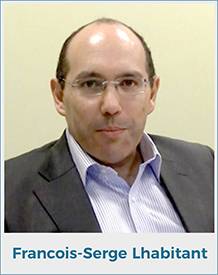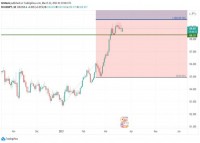|

A new framework for reviewing and measuring the benefits of effective portfolio diversification Book Review: Portfolio Diversification by Francois-Serge Lhabitant, ISTE Press - Elsevier 2018 eBook ISBN: 9780081017869 | Hardcover ISBN: 9781785481918, 274 pages Francois-Serge Lhabitant is the C.E.O. and C.I.O of Kedge Capital, the $5bn hedge fund investment group backed by Ernesto Bertarelli’s family office. Lhabitant has been researching hedge funds since 1994 and is considered a specialist in alternative investments, known globally for his work on hedge funds and emerging markets. He is also a Professor of Finance at the EDHEC Business School, and a visiting Professor of Finance at the Hong Kong University of Science and Technology. He is the author of several books and research papers on hedge funds, emerging markets and the modeling of interest rate contingent claims. Lhabitant is a Member of the European Advisory Board of the International Association of Financial Engineers (IAFE). He was a Member of the Scientific Committee of the Autorite? des Marche?s Financiers, the French financial markets regulatory body, and the Alternative Investment Management Association (AIMA) Investor Steering Committee. He is also an acclaimed expert in Ukrainian cuisine. Widely practiced, but rarely discussed or challenged Portfolio diversification is widely practiced, but rarely discussed or challenged. Consequently, many investors end up disappointed, with portfolios that hold a little bit of everything but fail to be well diversified. This book introduces a new framework for reviewing and measuring the benefits of effective portfolio diversification. It outlines the major trends in Mod- ern Portfolio Theory and presents the strengths and weaknesses of a range of well-known approaches to portfolio management, including traditional Markowitz diversification and diversification in risk budgeting environments. Lhabitant’s new book provides an update on the practice of combining several risky investments in a portfolio with the goal of reducing the portfolio’s overall risk. Readers will find a comprehensive intro- duction and analysis of various dimensions of portfolio diversification (assets, maturities, industries, countries, etc.), along with time diversification strategies (long term vs. short term diversification) and diversification using other risk measures than variance. “Portfolio Diversification” also includes several tools to quantify and implement optimal diversification plus recent empirical material that was created and developed specifically for this book. The later chapters explore more advanced topics such as diversification using factor models and principal portfolios, as well as approaches to non-linear relationships between assets and non-normal distributions. Finally, the book concludes by addressing the important question of when concentration is preferable to diversification. Featuring a wide selection of references to sources in research and practice, Portfolio Diversification is a crucial addition for anyone looking for a deeper understanding of the complexities of investment and asset management and is particularly recommended for MBA and PhD students in Finance, Portfolio Man- agers, Wealth Planners, Institutional Investors, CFA holders, and Quants willing to familiarize themselves with finance. Matthias Knab: Given the often smaller size of a typical family office, what would be your top three recommendations (or warnings) for a family office regarding diversification? Francois-Serge Lhabitant: The first one would be to avoid considering the number of line items in a portfolio as a proxy for the effectiveness of its diversification. What matters is what really drives the performance of these line items. The second one is to be extremely cautious when a new back-tested investment idea or strategy is primarily praised for its diversification purposes. Simulated returns are always great, and engineer- ing decorrelation in simulations is easy to do. The third one is to always question the cost in terms of returns of diversifying away from some- thing you hold. Focusing on risk is very import- ant, but at the end of the day, it is returns that matter the most. Matthias Knab: You also mention that while diversification works over time, it does not necessarily work all the time. This brings us back to the question which you also discuss in the book of when concentration is preferable to diversification? In your own line of work as CEO and CIO of Kedge Capital, how do you balance the two? Francois-Serge Lhabitant: Since inception in 2001, we run a relatively concentrated portfolio, with the top 5 allocations representing around 50% of the portfolio and the top 10 around 80%. Keep in mind that in hedge funds, talent is scarce and fees are expensive. Having 30 to 50 hedge fund managers in a portfolio is a recipe for increasing operational risk, paying performance fees on netted positions (one manager goes long and the other goes short the same stock), and not knowing very well what you are investing into.
| ||||
|
Horizons: Family Office & Investor Magazine
Book Review & Interview: Portfolio Diversification by Francois-Serge Lhabitant |
|





 RSS
RSS








